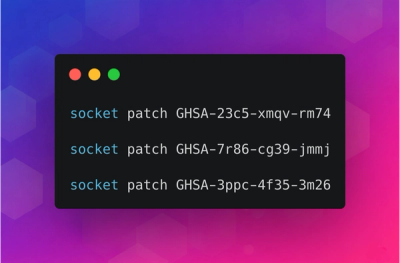
Security News
minimatch Patches 3 High-Severity ReDoS Vulnerabilities
minimatch patched three high-severity ReDoS vulnerabilities that can stall the Node.js event loop, and Socket has released free certified patches.
crypto-browserify
Advanced tools
A port of node's crypto module to the browser.
The goal of this module is to reimplement node's crypto module, in pure javascript so that it can run in the browser.
Here is the subset that is currently implemented:
these features from node's crypto are still unimplemented.
If you are interested in writing a feature, please implement as a new module, which will be incorporated into crypto-browserify as a dependency.
All deps must be compatible with node's crypto (generate example inputs and outputs with node, and save base64 strings inside JSON, so that tests can run in the browser) see sha.js
Crypto is extra serious so please do not hesitate to review the code, and post comments if you do.
MIT
Forge is a native JavaScript implementation of various cryptographic algorithms. It is similar to crypto-browserify but offers a wider range of features, including support for additional encryption algorithms, SSL/TLS implementation, and ASN.1 parsing.
This package is a wrapper around the libsodium library, which is a modern, easy-to-use software library for encryption, decryption, signatures, password hashing, and more. It is known for its focus on security and performance.
TweetNaCl is a port of NaCl, a high-security cryptographic library. It focuses on simplicity and small size, and it provides a straightforward API for encryption, decryption, and signing.
FAQs
implementation of crypto for the browser
The npm package crypto-browserify receives a total of 9,635,948 weekly downloads. As such, crypto-browserify popularity was classified as popular.
We found that crypto-browserify demonstrated a not healthy version release cadence and project activity because the last version was released a year ago. It has 5 open source maintainers collaborating on the project.
Did you know?

Socket for GitHub automatically highlights issues in each pull request and monitors the health of all your open source dependencies. Discover the contents of your packages and block harmful activity before you install or update your dependencies.

Security News
minimatch patched three high-severity ReDoS vulnerabilities that can stall the Node.js event loop, and Socket has released free certified patches.

Research
/Security News
Socket uncovered 26 malicious npm packages tied to North Korea's Contagious Interview campaign, retrieving a live 9-module infostealer and RAT from the adversary's C2.

Research
An impersonated golang.org/x/crypto clone exfiltrates passwords, executes a remote shell stager, and delivers a Rekoobe backdoor on Linux.